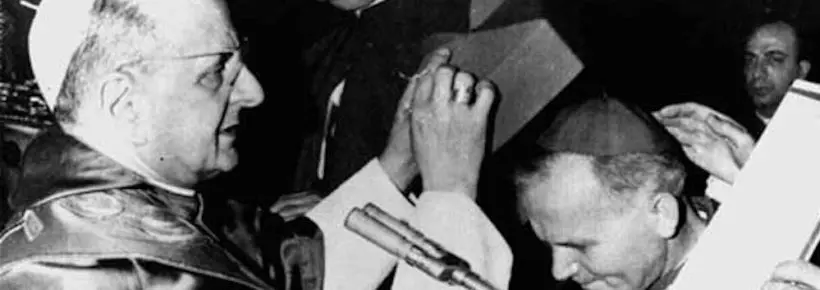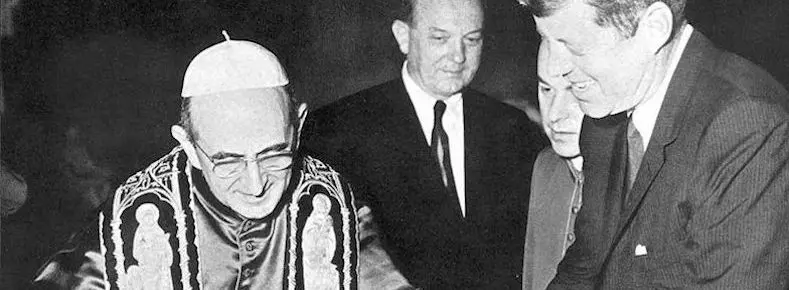Previous articles in this series:
- Part I: Introduction to Humanae Vitae
- Part II: The Predictions of Humanae Vitae
- Part III: The First Prophecy
- Part IV: The Second Prophecy
- Part V: The Third Prophecy
Later articles in this series:
- Part VII: Modernity’s Challenges to Humanae Vitae
- Part VIII: The Church’s Right to Teach on Birth Control
- Part IX: The Church’s Teaching Authority
- Part X: Principles of Humanae Vitae
- Part XI: The Moral Norm of Humanae Vitae
- Part XII: Doctrinal Objections to Humanae Vitae
- Part XIII: Pastoral Guidelines
What was the fourth prediction of Pope St. Paul VI?
The fourth and last prediction of St. Pope Paul VI in no. 17 of his encyclical Humanae Vitae is that the human person would falsely believe that he has a right to an unlimited dominion over his own body and even the bodies of others, including the ability to procreate. As Pope St. Paul VI himself said:
Consequently, unless we are willing that the responsibility of procreating life should be left to the arbitrary decision of men, we must accept that there are certain limits, beyond which it is wrong to go, to the power of man over his own body and its natural functions—limits, let it be said, which no one, whether as a private individual or as a public authority, can lawfully exceed. These limits are expressly imposed because of the reverence due to the whole human organism and its natural functions, in the light of the principles We stated earlier, and in accordance with a correct understanding of the “principle of totality” enunciated by Our predecessor Pope Pius XII.
St. Paul VI comes to his fourth prediction by following the rationale of his previous prediction to its logical conclusion. His third, previous prediction was that some governments would impose population control over their own citizens by means of contraception, sterilization or abortion. In such a case, it is obvious that those in government wrongly think that they have unlimited dominion over the bodies of their own people, even to the point of controlling their generative powers. We can easily extend this false right to a dominion over the bodies of others to the imposition of abortion, sterilization, embryo experimentation, trafficking of fetal body parts, euthanasia, and physician-assisted suicide, just to mention some examples.
It is true that we all have a certain dominion or autonomy over our own bodies. For example, we are responsible to care for our own health with the available means at our disposal. But we do not have the right to a complete autonomy over our own bodies or the bodies of others.
First of all, regarding our own bodies, it is evident that we do not have any control over certain bodily functions, such as, for example, the process of digestion. Moreover, from the moral point of view, both personal and social, we do not have the right to intoxicate ourselves with alcohol or drugs. If we happen to drive in such as state of mind, we can cause an accident lethal to ourselves or to others.

Secondly, according to the principle of totality of Pope Pius XII, we must not mutilate our bodies or impede a bodily function for any reason, but only for the sake of the whole body when there is no other means to save the whole body from death or serious harm. For example, a woman may not choose surgical or chemical sterilization simply out of fear of having more children. However, if a woman is suffering from a cancerous uterus, and there is no other way of saving her from such illness, she may undergo a hysterectomy. Notice that in this latter case, a future pregnancy had nothing to do with the decision to remove her uterus, but the intention was to save her whole body from death.
These commonsense arguments find their basis in the Word of God, which tells us that we are not the ultimate owners of our bodies, God is. In 1 Corinthians 6:13-15, 19-20, St. Paul teaches:
The body is not meant for immorality, but for the Lord, and the Lord for the body. And God raised the Lord and will also raise us up by his power. Do you not know that your bodies are members of Christ? Shall I therefore take the members of Christ and make them members of a prostitute? Never!… Do you not know that your body is a temple of the Holy Spirit within you, which you have from God? You are not your own, you were bought with a price. So, glorify God in your body.
It is true that St. Paul is applying the principle of our relative autonomy over our own bodies to the important area of human sexuality. But his reasoning can be easily extended to any area of our bodies. Notice that he offers a fourfold argumentation:
- The first argument is based on the promise of the glorious resurrection of our bodies, similar to the resurrection of Christ Himself, which God the Father will accomplish for us, just as He did for the human body of His Son Jesus (see also Philippians 3:21).
- The second line of thinking is based on the fact that we are members of the body of Christ, which is the Church.
- The third rationale is that our bodies are temples of the Holy Spirit.
- The fourth way of reasoning is based on the fact that Christ gave up His Body to redeem our bodies (and our souls), and thus acquired the right to rule over our bodies.
These four methods of argumentation are based on who we are as Christians and as bodily beings. For St. Paul, the human body is so important that it can actually acquire, through the resurrection, a glorious body similar to that of Christ. The body can be a member of Christ’s Body, thanks to His redemption of our bodies, and carry within it the Holy Spirit Himself. And the body can become capable of following God’s command of glorifying Him with our bodies. It is a magnificent defense of the dignity of the human body based on Trinitarian argumentation: God the Father will resurrect our bodies in a glorious state, God the Son makes us members of His own Body by means of His death on the cross, and the Holy Spirit indwells our bodies so as to sanctify us for eternal life and make us capable of glorifying God through our own bodies.

The Trinity on top of the Holy Trinity column in Linz, Austria
Christian revelation, therefore, extends the human argument for a limited autonomy of the human body to God’s ultimate ownership of our bodies, which ought to be used to glorify God Himself. The irony is that in the final resurrection our bodies will be completely free of any limitation that would impede us to freely love God, others, and ourselves.
Finally, it is clear from St. Paul’s teachings that the human body enjoys a special dignity or intrinsic worth in the eyes of God. From this conviction, we can easily draw the conclusion that the human body possesses a moral and a spiritual importance. We simply are not allowed to do anything we like to our own body or to the body of others. We are freed from the enslavement of sin and selfishness to live for God and others.
Contraception, sterilization and abortion enslave us to sin and selfishness, because they cause us to be selfish with respect to the transmission of human life and also to treat others (specially women) as if they were objects of pleasure instead of human persons who are ends in themselves and not means for selfish ends.
In our next article we will explore questions and modern social changes that challenge the perennial teaching of the Church against contraception, sterilization, and abortion. These questions and changes prompted St. Paul VI to write his prophetic encyclical, Humanae Vitae.
Previous articles in this series:
- Part I: Introduction to Humanae Vitae
- Part II: The Predictions of Humanae Vitae
- Part III: The First Prophecy
- Part IV: The Second Prophecy
- Part V: The Third Prophecy
Later articles in this series:
- Part VII: Modernity’s Challenges to Humanae Vitae
- Part VIII: The Church’s Right to Teach on Birth Control
- Part IX: The Church’s Teaching Authority
- Part X: Principles of Humanae Vitae
- Part XI: The Moral Norm of Humanae Vitae
- Part XII: Doctrinal Objections to Humanae Vitae
- Part XIII: Pastoral Guidelines
Related Content
Adolfo is the Director of Education for Hispanic Outreach for Human Life International and of HLI's Hispanic outreach arm Vida Humana Internacional. He has a Masters in Theology from St. Vincent de Paul Regional (Major) Seminary and a License in Moral Theology from the Alphonsian Academy in Rome.
Adolfo has traveled frequently to VHI’s affiliates in Latin America to give talks, training sessions, and media interviews. He has authored and co-authored books, articles, reports, and a pro-life training course for Hispanics in the U.S. Adolfo has also participated in the production of two TV pro-life series in Spanish, which have been aired through EWTN en Español.














